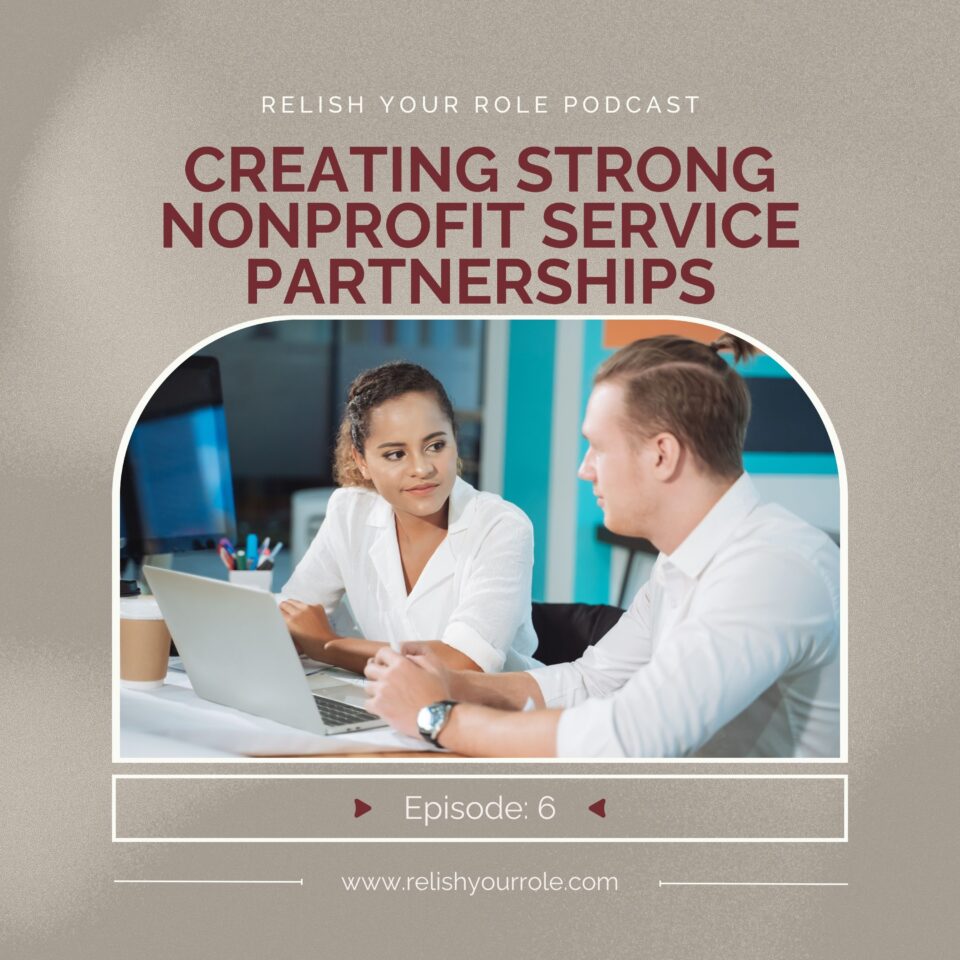Collaboration is Good Business
We know that interagency collaboration is best practice and smart business
But let’s be honest, it can be such a tricky dance working with a partner.
You can be one thousand percent committed to collaboration, but it is hard work to sustain a collaborative relationship over the long haul.
You are often competing for the same grant dollars. You may be competing for donors, board members or clients.
I know the words collaboration and competition don’t often go together, but it is true.
How can you as a nonprofit leader skillfully assert yourself while keeping the relationship productive. It is a nuanced maneuver to distinguish your agency in a respectful way which lifts your partners up while emphasizing your agency’s uniqueness.
You are not alone if you are feeling frustrated and annoyed with the higher maintenance aspects of partnerships. Suggestions below lay the groundwork to develop solutions.
Claiming Your Agency’s Unique Value
I know how important your partners are. But I also know as an Executive Director of a nonprofit managing those relationships can be a headache.
For example, is your agency often combined with similar organizations by funders or by your local government? If so, does it lead to group meetings where generalities are made which do not apply to your agency?
Do you struggle to kindly differentiate your agency from your partners?
How do you acknowledge the commonalities while establishing your unique lane?
I have a client who runs a rites of passage program for African American adolescents.
She has made many productive partnerships in her community yielding a variety of shared resources which aid her agency and clients.
A national funder is supporting her agency along with a number of other youth development programs in her community.
She was recently sharing with me her frustration when at a grantee meeting. She felt both the funder and partners were minimizing a number of aspects of her programming go to heart of her agency’s mission.
She asked me how she could point out her agency’s uniqueness without seeming defensive or an ungrateful participant in the group.
When I asked her to tell me how she would describe what makes her agency unique, she gave me a long-complicated answer which related back to her agency’s logic model and theory of change.
After my continued prompting and prodding, she was able to distill her answer into a response which was shorter and easier to understand. Her agency puts cultural heritage front and center in everything they do, and by creating deep ties with their clients’ culture, their self-esteem and resilience are strengthened.
Explaining Your Purpose
By clearly spelling out what they do and why they do it she found a way which emphasized her agency’s uniqueness without passing judgement on the work of her partners.
In identifying the connection between their services and belief system, she was able to establish her agency’s uniqueness in a non-defensive way.
How many of you can offer a similar straight forward description which connects your why with your how of your agency’s work?
When we form partnerships, we often skip the step of explaining the explicit link between the services and theory behind it. Too often we just focus on the ‘stuff we do’ and not so much on why we do it and how the ‘why’ shapes our delivery model.
As we continued to talk, she realized that she had not shared with her partners the why of her agency’s approach.
I have another client whose agency’s work depends on interagency case staffings. Two years into the program she realized that her primary partner had a weak understanding of how multi agency staffings work. They also were unfamiliar with the rationale behind bringing providers of different disciplines and roles together to staff and plan services for clients.
In this Executive Director’s desire to get the program up and going, she skipped the step of making sure all the partners had a shared understanding of the program model.
Both of these leaders bypassed an important element of making sure their partners fully understood their services.
Building Trust with Your Service Partners
You cannot build a trusting relationship with incomplete knowledge of your partner.
It is harder to hold each other accountable without trust in each other and you cannot build that trust with limited knowledge.
In our desire to expand our collaborations we often miss this crucial step of making sure we deeply understand one another.
When you step back and diagnose why a partnership feels unproductive, inconsistent or just shaky, the first place to investigate is if everyone is working off the same set of understanding. This understanding should be of what the agency does, but importantly why you do it.
You can only develop trust when you invest the time to educating each other through honest and thorough conversations.
We skip that step due to assuming because your partners work with similar clients for similar purposes, you do not need to take the time to share this type of information.
Even long-standing community partnerships can go awry. A helpful way to get it back on track is to go back to the why and how of each of your agencies’ work.
It is easier to share your concerns and work towards a resolution when you are confident that your partner fully understands where you are coming from and the belief systems underpinning the work of your agency.
It is hard, time-consuming work but it pays off dividends in keeping your partnerships viable and productive.
You can do it and I am here to help.

